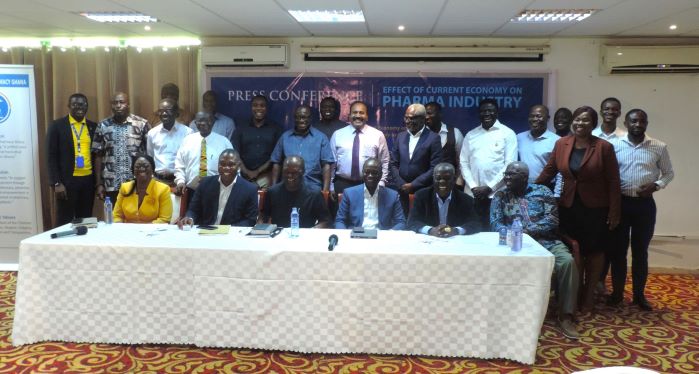Some pharmaceutical groups in Ghana have called on authorities of the National Health Insurance Scheme (NHIS) and the Private Health Insurance companies to give all accredited pharma facilities seed funds to purchase medicine in cash for supplies to patients under the scheme.
They noted that until the economy stabilises, all transactions with immediate effect must be on a cash basis rather than the previous credit-based method of payment.
The pharmaceutical groups include; Ghana National Chamber of Pharmacy (The Chamber), Pharmaceutical Manufacturers Association of Ghana (PMAG), and Pharmaceutical Importers and Wholesalers Association of Ghana (PIWA).
President of PIWA, William Adum Addo, said developments at the macro-economic level and their impact on pharmaceutical products and services require drastic decisions to be taken to save the industry.
He mentioned payment terms, fuel prices, inflation, exchange rate, utilities, and reversal of benchmark values as the leading indicators affecting the smooth running of the pharmaceutical business.
Payment terms
In terms of payment, he said that the pharmaceutical industry is credit-driven as such delayed payments and the presence of depreciating cedi have led to the erosion of operational capital for importers and manufacturers.
“Public sector pays on the average of six to 12 months because of delayed payment from the NHIS and most private sector facilities also make payment for supplies within three to four months. This is affecting our operation,” Mr Addo explained.
Inflation
The President of PIWA said with the current rate of inflation standing at 37.2%, there is an increase in the cost of goods and services thus affecting the essential accessories and other inputs needed for pharmaceutical operations.
Fuel Prices
Mr Addo further noted that the cumulative fuel prices increasing from the beginning of the year till date which stands at 71% affects transport costs and increases the cost of operations.
Exchange rate
He noted that the rise of the dollar from GHȻ5.80 to GHȻ13.90 is causing importers of finished pharmaceutical products who manufacture inputs and equipment for pharma operations to need more cedis for their operations.
“This confirms a ravaging nature of the cedi devaluation and its direct impact on pharmaceutical operations,” he stressed.
Utilities
The President of PIWA added that electricity and water remain indispensable in the conduct of pharmaceutical business; as such the cost increase by 27% and 21% respectively, affects the cost of doing business highly.
Interest rate
He explained that interest rates on loans acquired to finance pharmaceutical operations had escalated from 27% to 32% and default in payment attracts an extra 5% penalty rate.
“The delay in payment affects the liquidity and ability to service loans with the consequence of likelihood to default in loan payment affect our operations,” he said.
Reversal of benchmark values
Mr Addo noted that the reversal of discounts on benchmark values has negatively impacted the cost of doing pharmaceutical business in Ghana as importers of finished pharmaceutical products are made to pay 70% of applicable taxes on medicines.
Indicators affecting prices
The pharmaceutical groups noted that all the indicators mentioned above affect prices of general goods and services, as such the effect on pharmaceutical prices will not only result in challenges with medicine availability and accessibility but the quality of life of Ghanaians.
They called for immediate action to save the industry.
Call for action
“There should be no credit policy for all buyers so we can sustain the industry,” they stressed.
A joint press statement issued by the pharmaceutical groups called on the Ministry of Finance and Economic Planning (MOFEP) to release funds immediately to pay for the longstanding debt -nine months and to push to clear all overdue debts.
They emphasised that all end-user institutions including retail pharmacies, private hospitals and clinics must secure loans from banks to buy medicines in cash.
“We pay all statutory taxes to the government in cash, why must you buy on a credit basis,” they said.
The groups called on the Ministry of Health, the Ghana Health Service and the NHIS to discuss possible financial reengineering to save pharmaceutical businesses from imminent collapse.
- Thursday, April 3, 2025 Newspaper Headlines - 3 April 2025
- Trump slaps tariffs: Ghana, UK-10%, EU-20%, others-50% - 2 April 2025
- BoG policy rate hike: MPC’s 3-2 vote and reasons - 2 April 2025

